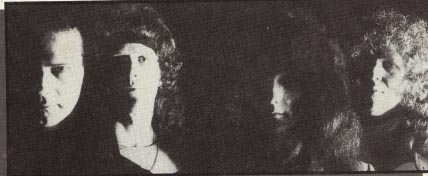

Press Archive - Features
Kerrang!
UNHEADED CLIPPING
You'll already doubtless be aware of the likes of Torme, Chrome Molly, Rogue Male and Warfare, to tag but four. However there are many other worthy acts floating listlessly just below the surface of popular Metal that need merely a helping hand to haul them from the undercurrents and into the upper echelon.
Firstly, there's one of my personal tips for the top, Scottish mob Chasar. They arrived - for me at least - with a spine tingling special for Tommy Vance at the butt-end of '82. Prime time Rush, seasoned with Alec Pollock's guitar histrionics, was more than enough to whet my appetite, and last year's self-titled debut album just about knocked me flat! They've recently added vocalist Pete Scanlon to take some of the weight from Alec's shoulders and add that extra dimension that the band lacked in a live situation.
Kerrang! sidebar, early 1986.
Kerrang! Mega Metal Special
THE BOYZZ WIV DA NOISE!
STITCH-UP ALERT! This article, for a Kerrang! special, saw the band seriously stitched up in the eyes of their fans at the time. In spite of the fact that the writer Paul Miller was obviously a serious admirer of Chasar, he chose to take the piss by 'Scottishing -up' the band's comments to the extent that much of the piece is virtually unintelligible. Still, it's included here as the band's only mainstream music press interview; also it's referred to in the fanzine article that follows. It'd be no great task to rip this apart critically, but the point is made simply by presenting it as an exact, letter-for-letter transcript ...
Chasar's gig tonight is in a very plush pub-cum discotheque in Ballock [sic], some 12 miles to the south west of Glasgow. Actually, I'm highly honoured as the gig has been specially set up so I can see the new line-up in action.
The latest addition to the band is vocalist Ian Taitz, a multi-talented guy who can also play bass and keyboards, who joins Chasar's six year old nucleus of Alec Pollock (guitar) and the Marshall brothers, Jim (drums) and Peter (bass).
It's not the best I've ever seen them but, as always, they were tighter than tight, displaying almost faultless musicianship.
The set boasted a host of Chasar's more elderly compositions and I'm almost certain that the likes of 'Destiny', 'Underground' and 'The Devil's Revenge' were slotted in purely for my benefit as the band know full well I'm a real sucker for those tunes. But the newer stuff seems to be coming along in leaps and bounds too. 'Out of Touch' works far better than its wishy-washy demo'ed cousin and 'Heartache' sees them in a different mould altogether, striking fear into the hearts of melodic acts everywhere as they turn their considerable skills up a far more malleable and commercial alleyway.
Do these newer, more commercial songs mean that Chasar are forsaking their Rush-soaked past? Are they leaving behind those 10 minute epics in exchange for three-and-a-half minute Shy-type ditties? These are the questions I put to the band.
"That came aboot cos we wanted ta see if we could write a few commercial wee tunes", Jim explains. "I don't think they were poppy, just good rock songs. We just made them a wee bit straightforward and that takes us a bit further away from that Rush tie."
Basically the more commercial stuff is an attempt to find what the band are capable of in that direction, I think. Their 'normal' songs, good as they are, are far from what most record companies would find palatable, as the band have already discovered.
"We went doon ta see record companies and they dennae want ta knoo yoo," Peter Tells me. "They'll talk ta management (something Chasar sorely need to give them a swift kick to the rear every so often) but they wont talk ta yoo."
I put it to Jim that it's the heavier bands that are getting the deals and perhaps the musical climate isn't right for Chasar at the moment.
"There's too many Ponk bands getting in that couldnae get anywhere so it's, 'Oh, let's try Heavy Metal'," Jim snaps. "Heavy Rock has lost its respect. A lot of people used ta say 'That's where the best musicians play, but they dennae think that anymore. 'Kerrang!' has got a lot ta do with it. I get fed op looking at people with their fingers op or their tongues hanging oot their mooths. Yoo get 'catch this band before they hit the stadiums, they're gonna be huge' and the guys are lucky if they can string a dozen chords together. If yoo take every band that's at the top, your Sabbaths, your Ozzy's, your Van Halens, the only reason they've stayed there is because they're so much better than everybody else."
Way back in 'Kerrang!' 105 Derek Oliver gave a positive summary of Chasar's only vinyl excursion thus far, their self- titled debut album, released on the little known American Phonogram [sic] label. "This stuff kicks some serious ass," quoth Mr Oliver, and he wasn't far wrong.
What 'Chasar' lacks in glossy finish it makes up for with boundless energy and the band's staggeringly high musicianship, screamin' at you like a multitude of Malmsteens, Cobhams and Clarkes from every groove.
Yet they only spent two-and-a-half-days in the studio on what is basically nothing more than a demo.
The album aside, a problem I've found with Chasar is the vocals. As a trio Alec handled them but his voice seemed particularly stretched. Hardly surprising as he also had to play at being frontman as well as providing the lead guitar work.
From an audience point of view that problem's been lessened by a succession of vocalists. But for the band it's brought all the additional hassles that accompany a new singer.
"Yoo've gotta try a lotta people ta get the right person," says Jim. "It takes a few months ta discover personalities."
"But it's certainly better as a four- piece," adds Alec. "I couldnae sing a full gig. I didnae feel comfortable being the frontman."
So with Ian settling in nicely, the band must be limbering up for a real stab at success. Touring Scotland endlessly is just flogging a dead horse as the number of acts who get noticed playing the highlands can be counted on the thumbs of your right hand.
"Last time we played the Marquee (supporting fellow Scots Pallas) it went really well," Jim tells me. "But if I thought going ta London meant making it we'd have bin there yesterday. Boot that's when yoo poot pressure [on] the band - no money and you're sitting in bloody squats all the time. Yoo don't want to doo that, y'knoo."
And he's right, too. While the move to London pays handsome dividends for the lucky few, for most bands it signals despair, poverty and the eventual break up of the band. But Chasar desperately need to enhance their profile outside of their homeland ... let's hope that somehow, at some time it happens for them.

Paul Miller, Mega Metal Kerrang!, late 1986.
Paint It Black
WHATEVER HAPPENED TO SCOTTISH ROCK?
Fact: 'getting successful' is not as easy for a Scottish rock band as for a band in any other part of the U.K. Why?
Presumably it's mainly down to the traditional Scots/English divide and the prejudices between the two. The media and most record companies are controlled by and large from England, mainly London, and the attitude of most of the individuals in charge, is that no matter how strong a following a band may have in Scotland, and/or no matter how good the band is, if they're Scottish they don't matter.
Of course, the occasional pop act gets through this net of prejudice if they're pretty enough - be it Wet Wet Wet. Hue and Cry or Deacon Blue. Even then the likes of Love and Money and Hipsway remain unknown (and unpromoted) South of the border, despite impressive record sales in their native Scotland.
Ultravox and Big Country were the last two serious mainstream rock exports from Scotland. Run Rig at last look to be following in the same way, if they can survive the rather unfair Big Country comparisons and Blues 'N' Trouble have surprisingly just been rescued from the giant slagheap of Scottish r'n'b by CBS and a six-figure deal.
This leaves two particular genres - indie and heavy rock/metal. Both have always been very healthy on the live circuit in Scotland and labels such as DDT help keep the indie record scene alive up here but, again, their product is ignored down south.
Indie bands have less trouble than most with media attention and a couple of years ago Scots bands were able to milk that for all they were worth. The Mary Chain was the only one to really break through, leaving The Shop Assistants to split and The Soup Dragons simply to flounder.
Now, though, the indie scene is more than healthy again thanks to Jesse Garon and the Desperadoes, The Thanes, Talulah Gosh, The Offhooks, The Stayrcase etc.
The problems facing Scottish heavy rock bands are twofold and probably best illustrated by the downfall of Chasar after about eight years of trying to 'make it'.
They were the most popular hard rock band in Scotland, did a session for Tommy Vance's 'Friday Rock Show' on Radio 1 and their eponymous debut album sold impressively - first as a self produced cassette and then on vinyl (on the indie label American Phonograph). Still the Southern-based music press all but ignored them (being Scottish was bad enough - but heavy too! Gaah!).
When the Kerrang! magazine published a review of the album the writer Derek Oliver said of it '...this is progression on a level with Zeppelin ('Houses of the Holy') and Rush ('Caress of Steel') ...' and yet when they were finally interviewed by Paul Miller for the same publication (or rather a "Mega Metal" special) the band found themselves victims of more prejudice. The writer decided to quote them by writing down what they were saying in 'dialect' and even misspelling correctly pronounced words to make them look more 'Scottish' ('yoo don't want to doo that y'knoo'. Really.). Despite his obviously high regard for the band and their incredibly high standard of musicianship, he managed to turn what could have been a very important moment for them into a complete farce.
And so the ridiculous prejudices against both Scots and heavy rock piled up against Chasar, causing them to finally split in 1987. A great pity.
Well, who's left? Tips for the top include the aforementioned indies the Desperadoes (good, jangly pop); The Thanes (the original garage revivalists) ; The Offhooks (including members of both the Desps and The Thanes - and my personal favourites) and finally Lixx, terribly named but excellent US style heavy rockers.
Not to mention Dirty White Funk.
Of course there are many other good Scottish rock bands, most of whom I probably haven't even heard of. Whether or not they hit the big time depends entirely, of course, on the Southern press and the Southern-based record companies opening their eyes and ears to see past their own petty prejudices and find the real talent.
From fanzine Paint it Black (also published in the Falkirk College magazine), 1989.